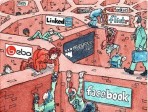 00:44:00
00:44:00
Towards a decentralised and personalised Web
Social networks and collaborative tagging systems have taken off at an unexpected scale and speed. Pretty much everyone now generates Web content. This represents a revolution in usage and a great opportunity to leverage collaborative knowledge to en....
More details | Watch now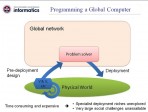 00:43:00
00:43:00
Programming the social computer.
The aim of programming the global computer was identified by Robin Milner and others as one of the grand challenges of computing research. The Internet, however, has brought with it a different style of computation that operates in a style different ....
More details | Watch now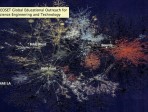 00:31:00
00:31:00
Networks in ecosystems and financial systems
This talk surveys our growing understanding of the relationships between the network structure of ecological networks ? both in mathematical models and in the real world ? and their ability to withstand disturbance, natural or human-created.
More details | Watch now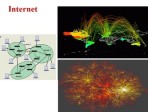 00:34:00
00:34:00
Visit our website The structure of the Web
Systems as diverse as the World Wide Web, Internet or the cell are described by highly interconnected networks with amazingly complex topology. Recent studies indicate that these networks are the result of self-organizing processes governed by simple....
More details | Watch now 00:45:00
00:45:00
The nature of collective intelligence
Digital data stem from our own personal and social cognitive processes and thus express them in one way or another. But we still don?t have any scientific tools to make sense of the data flows produced by online creative conversations at the scale of....
More details | Watch now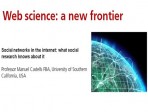 00:48:00
00:48:00
Social networks in the internet.
The Web has become the fabric of our lives. However, its understanding in terms of social practice is obscured by ideology and media sensationalism, in spite of the fact that social sciences have gathered over the last decade a solid record of empiri....
More details | Watch now 00:46:00
00:46:00
Augmented intelligence: the Web and human computation
This talk is about harnessing human time and energy to address problems that computers cannot yet solve. Although computers have advanced dramatically in many respects over the last 50 years, they still do not possess the basic conceptual intelligenc....
More details | Watch now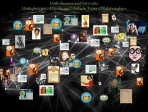 00:45:00
00:45:00
Developing Web Science for the 21st century.
Recent advances in Web Science provide comprehensive digital traces of social actions, interactions, and transactions. These data provide an unprecedented exploratorium to model the socio-technical motivations for creating, maintaining, dissolving, a....
More details | Watch now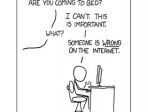 00:47:00
00:47:00
Will the Web break?
This talk will enumerate and assess some of the major threats to the continuation of the Web as we know it, and suggest some strategies to preserve its key values.
More details | Watch now 01:06:00
01:06:00
Information theory meets writing
Professor MacKay talks about Dasher, and other communication systems designed using information theory; especially communication systems aimed at disabled people.
More details | Watch now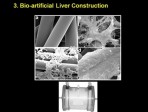 01:04:00
01:04:00
Cloning, stem cells and regenerative medicine
Extraordinary opportunities to study the molecular mechanisms that cause inherited diseases are being provided by new methods of producing stem cells. Hear about not only the potential value of these new methods, but also how their development was pr....
More details | Watch now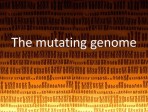 01:06:00
01:06:00
Our genomes, our history
Genetic differences between humans reflect the fundamental processes, such as mutation, recombination and natural selection, which have influenced our evolutionary history. Now that we can chart the genomes of many individuals, we are finding many su....
More details | Watch now 01:17:00
01:17:00
Mammalian biodiversity: past, present, future?
Beautiful and charismatic, mammals are biodiversity icons. But a quarter of mammalian species are now threatened with extinction, as ecosystems reel under the impact of a growing and ever more demanding human population. This lecture explores the his....
More details | Watch now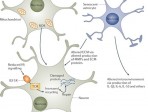 01:06:00
01:06:00
Three score years and then? The new biology of ageing
Ageing is the single greatest challenge facing our society today. Recent breakthroughs have demonstrated that it is possible to combine a long life with the absence of age-related disease. Scientists at the forefront of this research will explain the....
More details | Watch now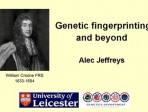 01:07:00
01:07:00
Genetic fingerprinting and beyond
Professor Jeffreys will describe how DNA typing can be used to solve casework and will review the latest developments, including the creation of major national DNA databases that are proving extraordinarily effective in the fight against crime.
More details | Watch now 01:00:00
01:00:00
Seeing Further – The Story of Science and the Royal Society
The Story of Science and the Royal Society - a panel discussion chaired by Melvyn Bragg. The panel is made up of Bill Bryson, Maggie Gee, Richard Holmes and Ian Stewart FRS.
More details | Watch now 01:00:00
01:00:00
The great ideas of biology
Three of the ideas of biology are the gene theory, the theory of evolution by natural selection and the proposal that the cell is the fundamental unit of all life. A fourth idea is that the organization of chemistry within the cell provides explanati....
More details | Watch now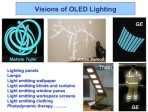 01:00:00
01:00:00
Plastic Electronics.
Plastics have become ubiquitous structural materials due to the ease with which they can be processed at low cost into complex shapes. Imagine a world in which metals and semiconductors have similar attributes ? that is the world of Plastic Electroni....
More details | Watch now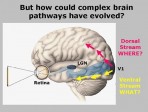 01:00:00
01:00:00
Plasticity of the brain: the key to human development.
How do our genes program the complexity of our brains? Why is human culture so much richer than that of the Great Apes? And how has human cognitive achievement continued to accelerate, when our genetic makeup has changed very little over the past 100....
More details | Watch now 01:02:00
01:02:00
Geoengineering: a brave new world?
This is a very new and rapidly developing area of science and technology and the proposals range from placing giant mirrors in space to reflect sunlight to fertilising the oceans with nutrients in order to produce more phytoplankton to soak up atmosp....
More details | Watch now .....
.....
The eerie silence – are we alone in the universe?
Fifty years ago, a young astronomer named Frank Drake pointed a radio telescope at nearby stars in the hope of picking up a signal from an alien civilization. Thus began one of the boldest scientific projects in history: the Search for Extraterrestri....
More details | Watch now 01:02:00
01:02:00
Thinking like a vegetable: how plants decide what to do
Plants monitor a wide range of information from their surrounding environment. They combine information of multiple sorts, and respond in an appropriate way. In plants there is no brain, and the information processing is distributed across the plant ....
More details | Watch now 01:12:00
01:12:00
Brain development and brain repair.
The human brain is made up of close to a trillion nerve cells (or neurons), each of which makes connections with, on average, hundreds of other nerve cells, to form the complex neuronal circuits that control all brain activities, including perception....
More details | Watch now